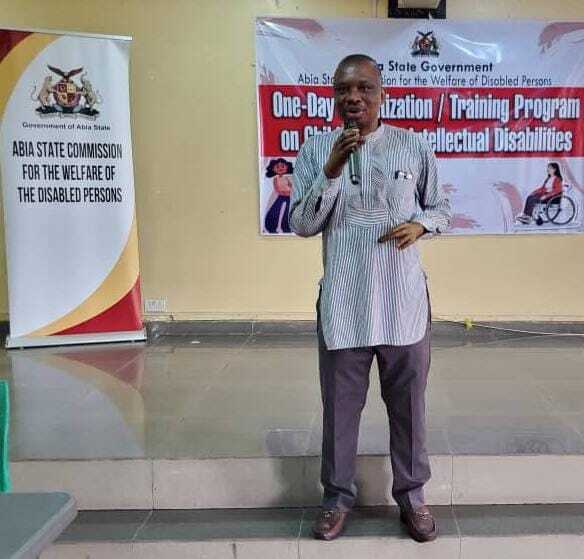The Abia Government says it will raise at least 250 therapists across the 17 Local Government Areas to support children with intellectual and learning disabilities in the state.
Mr David Anyaele, Chairman of the Abia State Commission for the Welfare of Disabled Persons, said this during a sensitisation workshop, in Umuahia for stakeholders and caregivers.
The workshop gathered various stakeholders, including government agencies, teachers, health workers, parents, and caregivers concerned with special needs education and welfare.
The event aims to enlighten stakeholders on their role in supporting children with disabilities and promoting inclusive participation in education, healthcare, and community life.
Anyaele said the therapists would help identify affected children and their families, addressing challenges that prevented equal participation in school, social life, and general society.
He described the sensitisation as a foundational step, saying teachers and stakeholders must understand their role before therapists began classroom-level engagement and direct interaction with families.
Anyaele said the objective was to expand stakeholders’ understanding of intellectual disabilities and help them identify local opportunities to support those children within their communities.
He reiterated the government’s commitment to empower people with disabilities, promoting their rights and dignity, and creating opportunities for their full participation in society and development.
“It is our hope that participants will support the investments by Gov. Alex Otti in education and healthcare to ensure inclusivity,” Anyaele said, stressing the need for equal access for all.
He noted that the sensitisation, the first of its kind in Abia, would be extended to other local government areas to deepen community engagement and awareness.
Guest Lecturer, Mrs Nnenna Osu, advised stakeholders to seek early intervention once signs of intellectual or learning disabilities were noticed, to ensure timely and effective support.
Osu, a Magistrate in Abia State Judiciary, urged collaboration with professionals, support networks, and ongoing education to ensure independence and dignity for children with intellectual and learning disabilities.
Osu, Founder of Brain Activate Initiative, said the presentation aimed to raise awareness about children with intellectual disabilities and how best to integrate and support them in society.
She stated that globally, about 2–3 per cent of children had intellectual disabilities, while approximately 15 per cent of students experience some form of learning disability across various levels of severity.
Mrs Matilda Anyamaele, Special Assistant to the governor on Arts and Culture, hailed the initiative and called for its extension to the private sector and other community groups.
She advocated for special schools, noting that many of the children had unique challenges that required personalised attention beyond what mainstream education currently provided.
In an interview, Rev. Sr. Getrude Ukanwoko of St. Vincent De Paul Centre for Persons with Disabilities, Umuahia, lauded the organisers, saying the session was highly educational and needed.
“I have personally learnt a lot. More of such programmes are needed because many of these children are misunderstood, mistreated, and even nicknamed unfairly,” she said.

